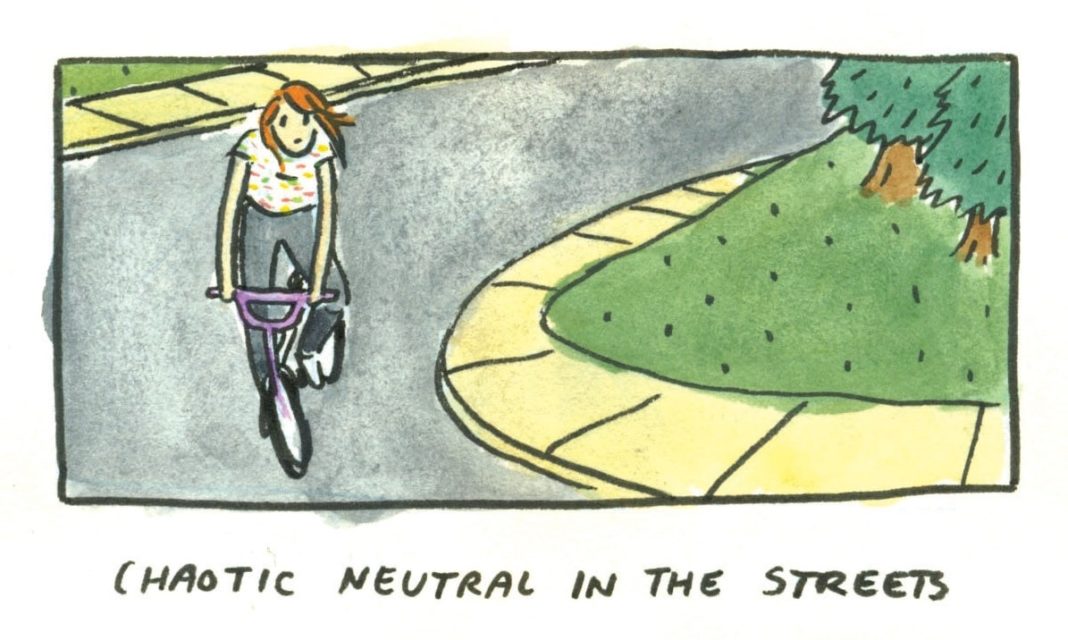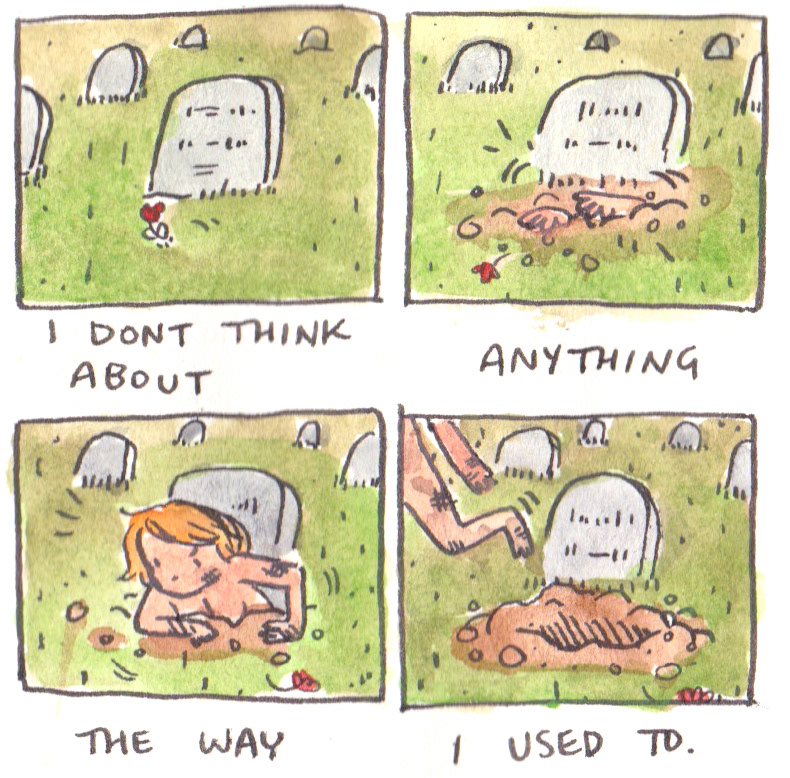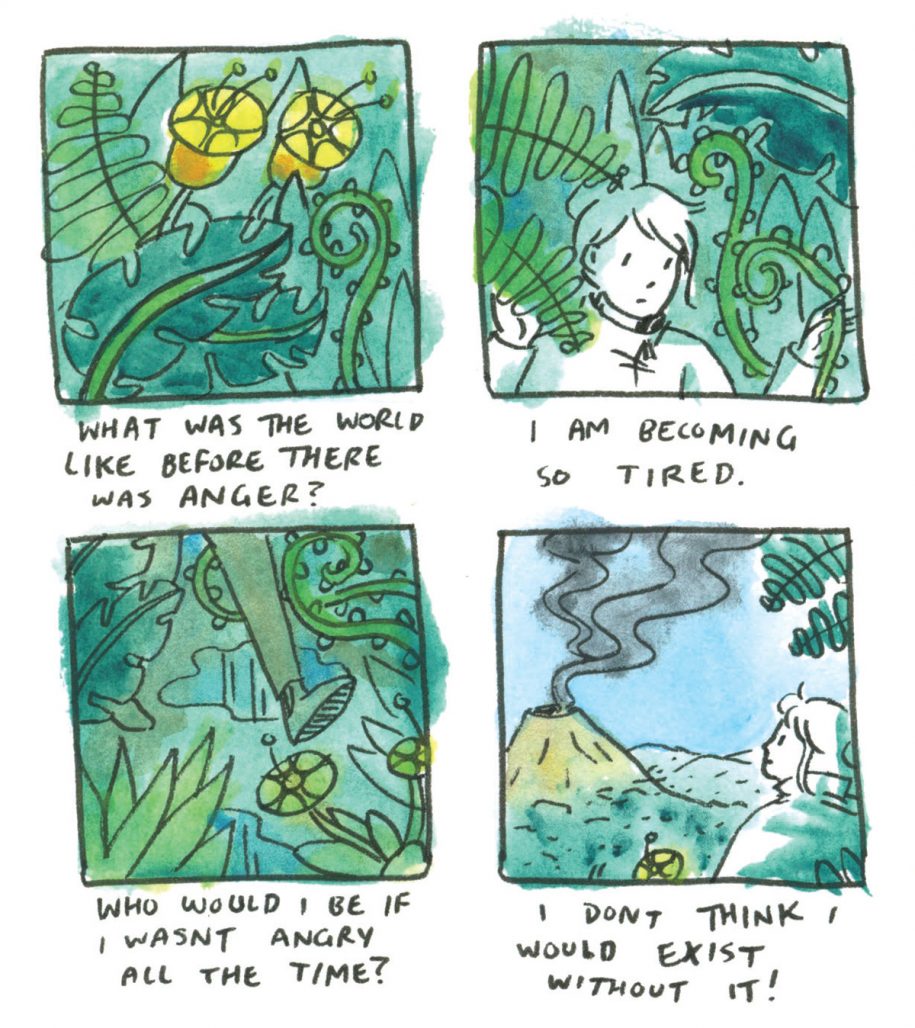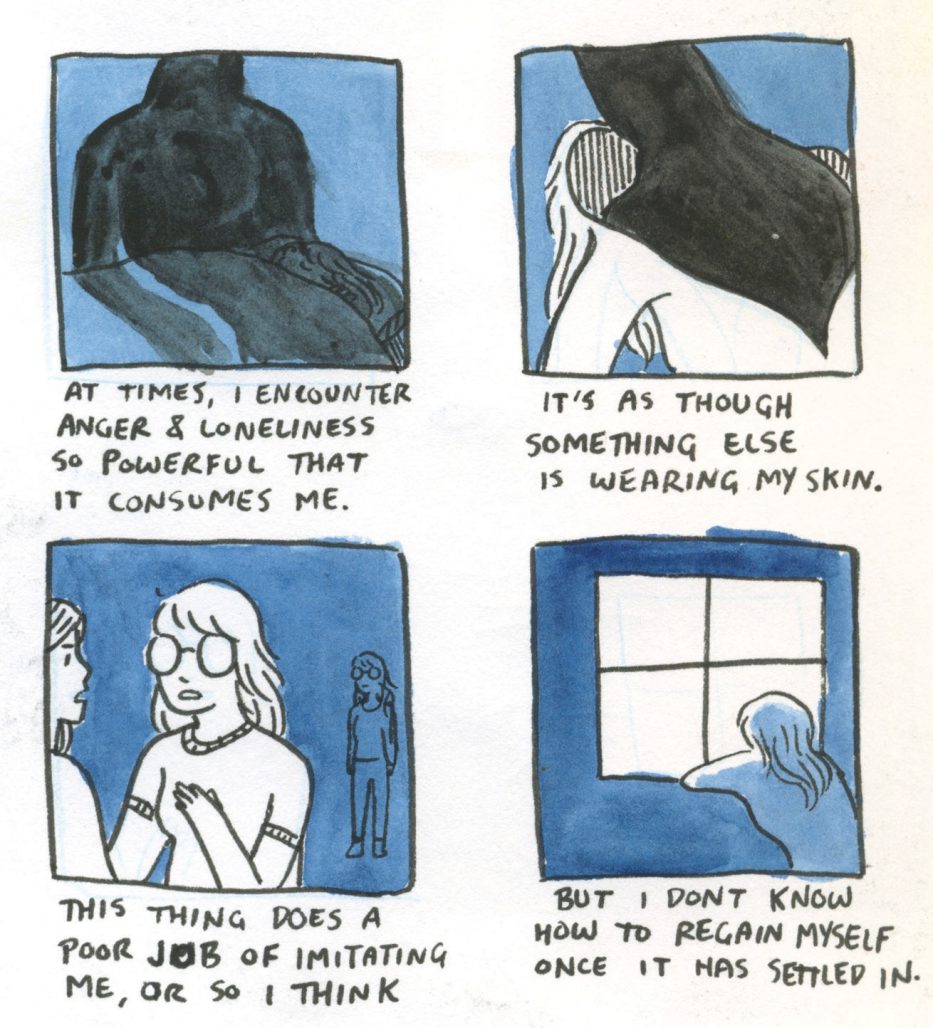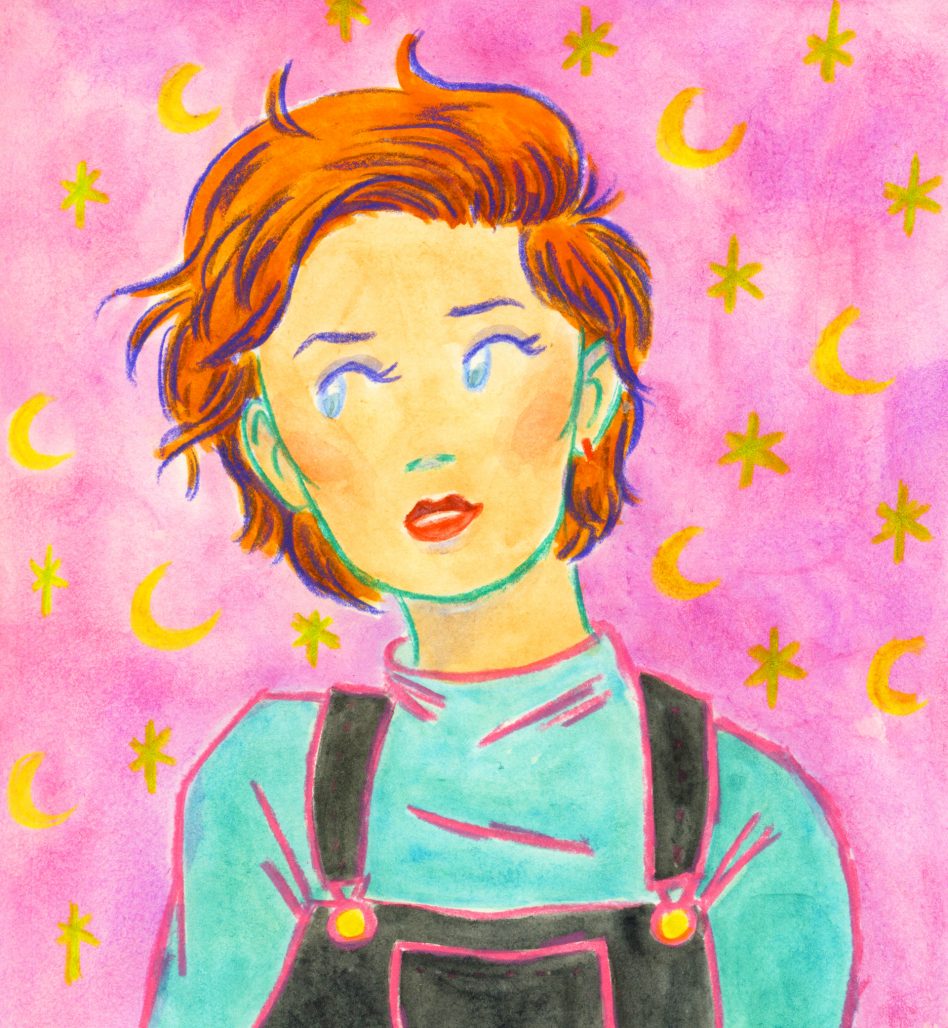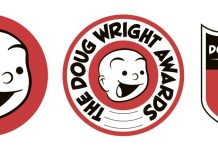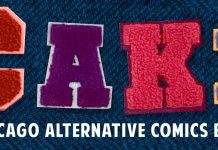The Toronto Comic Arts Festival is one of the most influential and important comic book event in North America. Its mission is to “promote the creators of comic books in their broad and diverse voices, for the betterment of the medium of comics”. In the spirit of this mission, The Beat has conducted a series of interviews with some of the phenomenal cartoonists in attendance at this year’s festival. We hope that these interviews will improve our understanding of these creators’ voices, techniques, interests and influences. Read on for our interview with Meredith Park.
Meredith Park is a cartoonist and illustrator best known for her long-running online daily comics. We’ve highlighted her work as some of the best web comics of 2017. At the time, I said of her daily comics that: “They are introspective and light, just as they can be melancholic and dark. They’re a beacon of tenderness in the cesspool that has become Twitter and it’s a wonderful thing to see.” Two years later, I still feel very strongly about that statement. Meredith has gracefully agreed to chat about daily comics, colouring, faith and family.
Philippe Leblanc: For those readers who may not be familiar with you and your work, can you tell us a little bit about yourself?
Meredith Park: Thank you, hello! I’m a cartoonist and illustrator, I just finished college (I did it late) and I work a handful of different jobs. I grew up in a couple different parts of America but I live in southern Ontario now. I like it here. I mostly make autobio comics but I really enjoy some of the illustration and environmental design I’ve done locally as well. I live in the centre of the city in a big house with a bunch of wonderful people, and I’m fairly involved with my church. I make coffee, I volunteer, I work with youth, I work on bikes. I’m trying to get more into video games these days. I want to take music lessons at some point. I have to think about getting a credit card soon. That’s some of it.
Leblanc: You’re currently in the last stretch of your degree at the George Brown College’s School of Design (congratulations!). How does it feel to reach this milestone? How has this experience contributed to your growth as a comic artist?
Park: Thank you. It hasn’t totally sunk in yet, but right at this moment I’m glad to have one less thing on my plate. I have complicated feelings about higher education in general. It was hard to do and I didn’t enjoy it, but in due time I figure I’ll be glad I got the skill set. For the most part, I’ve been impatient to finish it so I can put all that energy into other things! I’ve made much less personal work in these last couple years. I like having a better understanding of how to design my books and it’s nice to be more comfortable with the production side of making comics. I’m sure it’ll come in handy more and more as I go.
Leblanc: You’ve been making extremely thoughtful and personal four panel comics for a few years now. I’m curious to know how this ongoing project came about.
Park: Yeah, so I was at a low point with my mental health and out of work at the time. I didn’t have a doctor then, I couldn’t get counselling…It was the dead of winter, and it felt like the weeks were all blurring together. I needed some way to mark each day so I set the goal of making a daily comic, even if it was just documenting the walk to my studio. With practice and reflection, my writing and drawing choices improved, and I started really playing with the possibility of what comics could do to help me process my emotions. To finish a comic and post it to the internet felt like cutting the tether to whatever difficult thoughts I’d been processing. I didn’t even think about if anyone would read them, it just felt helpful to release them in that way. The thoughts were no longer mine to obsess over.
Leblanc: There’s a wonderful quality to those comics. You manage to strike a very interesting balance between introspection and universality. They can be light, just as they can be melancholic and dark. Could you tell us what your creative process for those four panel comics?
Park: Thank you. I don’t think it’s a unique process, it’s mostly a lot of thinking and asking myself about it. What am I thinking about today? What can’t I stop thinking about? Or, what am I trying to avoid thinking about? And then, why? What does that mean? Do I need to act, does something need to change? What am I going to do with it now? That’s the gist of it. When I’ve done all that, I work on whittling it down into the sparest possible wording. That part is more pleasurable, I’m just cutting off all the excess and trying to expose the marrow of the thing. I read a lot and have friends who like to talk about all the real stuff, deep stuff, so I think all the art and music and conversation I absorb goes into what I make too. The drawing is all spur of the moment. Occasionally I’ll have had an idea of what images I want beforehand. Usually I spend all the time writing the comic and when I sit to draw I just pull it out of a hat. You could probably psychoanalise why I do it that way. I have noticed I draw a lot of beds, sidewalks, bikes, bathroom sinks and mirrors. Lots of room corners where the walls and ceiling meet.
Leblanc: Some of those comics are coloured in delightful naturalistic watercolour and some are in black & white. What makes you decide whether you want to publish a comic in colour or not? Could you also tell us about your colouring process?
Park: The sketch comics in pencil or pen are all observational. I make those when I’m in class or at work and just want to jot something down. I like how sparse it looks. Currently I’m out of the habit of painting, but I want to get back into it. I use a little travel set, I’ve had the same one for years. Its colours are very saturated. I have bad eyesight and saturated colours provide the most contrast, which helps. I do not have good colour theory, and having a small set of paints means my palette has been chosen for me. If I had to choose my own palettes, I’d end up in the weeds. I should probably use gouache except I draw my lines first and then fill them in with colour, which works better with watercolour. Any fancy stuff beyond that is a happy accident. Thank you, though.
Leblanc: You’re also quite open about your faith on Twitter. You’re a regular church attendee and you’ve been actively involved in your religious community in Hamilton through your arts and in different capacities. I’m curious to know how that influences your work?
Park: Well, religious life involves disciplines, like prayer, hospitality, communing with others, etc. I am pretty undisciplined but in my way, I try. I’ve had times where I’m praying or receive a vision and I’m able to write it down and draw what I saw. Not often. Then again, if prayer is a conversation with God, then all my comics are prayers. Listening and speaking. Everything all the time is a spiritual movement. I love the church I’m at now. It’s not perfect, but it’s been a good place to land. I grew up in mainline western evangelicalism and I am glad to be away from that world now. I think you can inherit faith to a point, if you’re raised with it, but it’s also a gift that you have to receive for yourself. You can’t carry someone else’s forever. I used to believe it in the way where I was afraid of going to hell, and I needed to be right and save people. That kind of belief really pigeonholes you, it makes the world small. And it’s a poor witness to the story of Jesus’ life. If God is who she says she is, and my lived experience can only confirm this, then it’s not my job to save people. My hands are freed to participate in the healing of the world. There’s so much mystery and beauty and justice to be carried out. The world is enormous, and there are so many ways to be a person. Life for the living and all that. And there’s just so much to write about.
Now, being christian in north america, I am afforded more freedom to publicly discuss my beliefs. I know faith is not supposed to be safe, but I don’t think my work will be worth much unless it offers strength or space for artists in other faith traditions to do the same. At the end of the day, church is a human institution, so we will always have to fight the rot from inside our doors, as well as beyond. But this is my life, I will be part of this thing. “The Church is a whore but she’s still my mother”, you know? As I examine my faith and wrestle with it, I will keep recording everything.
Leblanc: You’ve mentioned taking inspiration from your family, and your niece Clementine in particular. How does their influence reflect in your work?
Park: Family is complex, working our stories into my work feels like trying to record mythology. My family are the most important to me, we’re very tight-knit. They bring the best out of me, and they expect the most from me. I think that’s as much as I can say. We are protective of each other. They aren’t out in the spheres where most of my work exists. I want to tell stories about us, but I don’t know how to do that yet. It’ll get complicated but I’m going to try. I have no nieces or nephews, Clementine is one of the people who lives at my house. She’s going to turn 3 this summer. We have a Richard Scarry book we read to her, and one of the pages says “what a wonderful person I am” and I think that about her all the time – what a wonderful person she is. My housemates are my gifted family, and our home is an oasis. Communal living is unique to the culture we live in, but it’s something people want in their hearts I think. If you’re lonely, broke, or you’re tired of rugged individualism, think about it. It takes work but the kind of work that benefits you much, in the long run. We’ve had a good thing going.
Leblanc: What do you want readers to take with them once they’ve finished reading your comics?
Park: Thank you for reading. If it’s nice out where you are, you should go outside.
You can find Meredith Park’s comics on her website, read her daily comics and visit her online store. You can also follow her on Twitter & Instagram.
You can come meet Park during TCAF. She’ll be at table Q-9 on the second floor. She’s excited to talk to you about her work.


